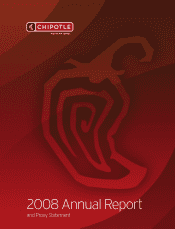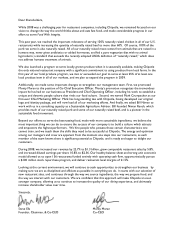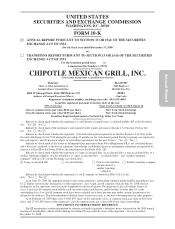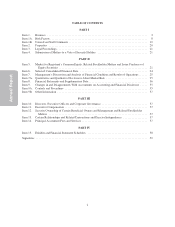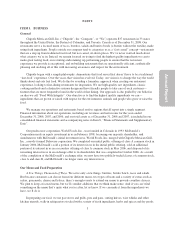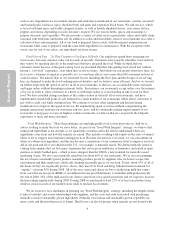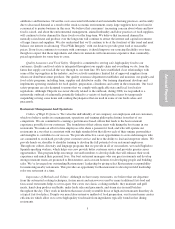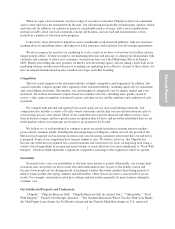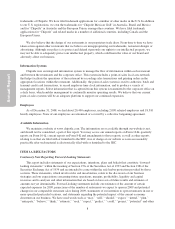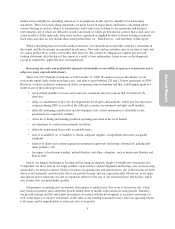Chipotle 2008 Annual Report Download - page 7
Download and view the complete annual report
Please find page 7 of the 2008 Chipotle annual report below. You can navigate through the pages in the report by either clicking on the pages listed below, or by using the keyword search tool below to find specific information within the annual report.
antibiotics and hormones. Given the costs associated with natural and sustainable farming practices, and recently
due to decreased demand as a result of the weak economic environment, many large suppliers have not found it
economical to pursue business in this area. We believe that consumers’ increasing concern about where and how
food is raised, and about the environmental management, animal husbandry and labor practices of food suppliers,
will continue to foster demand for these foods over the long-term. We believe that increased demand for
naturally raised meat and produce over the long-term will continue to attract the interest and capital investment
of larger farms and suppliers. We also understand that we’ll continue to be at the forefront of this trend and must
balance our interest in advancing “Food With Integrity” with our desire to provide great food at reasonable
prices. If our focus continues to resonate with consumers, it should improve our sourcing flexibility over time,
though we expect that these ingredients and other raw materials will remain more expensive than commodity-
priced equivalents for some time to come.
Quality Assurance and Food Safety. Chipotle is committed to serving safe, high quality food to our
customers. Quality and food safety is integrated throughout our supply chain and everything we do; from the
farms that supply our food all the way through to our front line. We have established close relationships with
some of the top suppliers in the industry, and we actively maintain a limited list of approved suppliers from
whom our distributors must purchase. Our quality assurance department establishes and monitors our quality and
food safety programs, including farm, supplier and distributor audits. Our training department develops and
implements operating standards for food quality, preparation, cleanliness and safety in the restaurants. Our food
safety programs are also designed to ensure that we comply with applicable state and local food safety
regulations. Although Chipotle was never directly related to the outbreak, during 2008, we responded to a
nationwide outbreak of salmonella potentially linked to a variety of fresh produce items by temporarily
suspending serving some items and cooking the jalapenos that are used in some of our fresh salsas and
guacamole.
Restaurant Management And Operations
Culture of High Performers. We value the individuality of our company, our employees and our customers,
which we believe results in a management, operations and training philosophy distinct from that of our
competitors. We are committed to creating a performance based culture that leads to the best restaurant
experience possible for our customers. The foundation of that culture starts with hiring the best teams in our
restaurants. We make an effort to hire employees who share a passion for food, and who will operate our
restaurants in a way that is consistent with our high standards but that allows each of their unique personalities
and strengths to contribute to our success. We provide attractive career opportunities to crew and managers who
are committed to work hard, provide great customer service and have the ability to lead and empower others. We
provide hands on, shoulder to shoulder training to develop the full potential of our restaurant employees.
Through our culture, diversity and language programs that we provide in all of our markets, we teach English to
Spanish-speaking workers, which helps our crew provide better customer service and provides greater career
opportunities. This program helps encourage our staff members to develop skills that will enhance their work
experience and enrich their personal lives. Our best restaurant managers who run great restaurants and develop
strong restaurant teams are promoted to Restaurateur, and can earn bonuses for developing people and building
sales. We’ve leveraged our outstanding Restaurateurs’ leadership by giving select Restaurateurs responsibility
for mentoring nearby restaurants. This provides an opportunity for Restaurateurs to develop in field leadership
roles one restaurant at a time.
Importance of Methods and Culture. Although we have many restaurants, we believe that our departure
from the automated cooking techniques, frozen meats and microwaves used by many traditional fast-food and
fast-casual restaurants helps to set us apart. Our crews use classic cooking methods: they marinate and grill
meats, hand-chop produce and herbs, make fresh salsa and guacamole, and steam rice in small batches
throughout the day. They work in kitchens that more closely resemble those of high-end restaurants than they do
a typical fast-food place. Despite our more labor-intensive method of food preparation, our focused menu creates
efficiencies which allow us to serve high quality food made from ingredients typically found in fine dining
restaurants.
5
Annual Report

